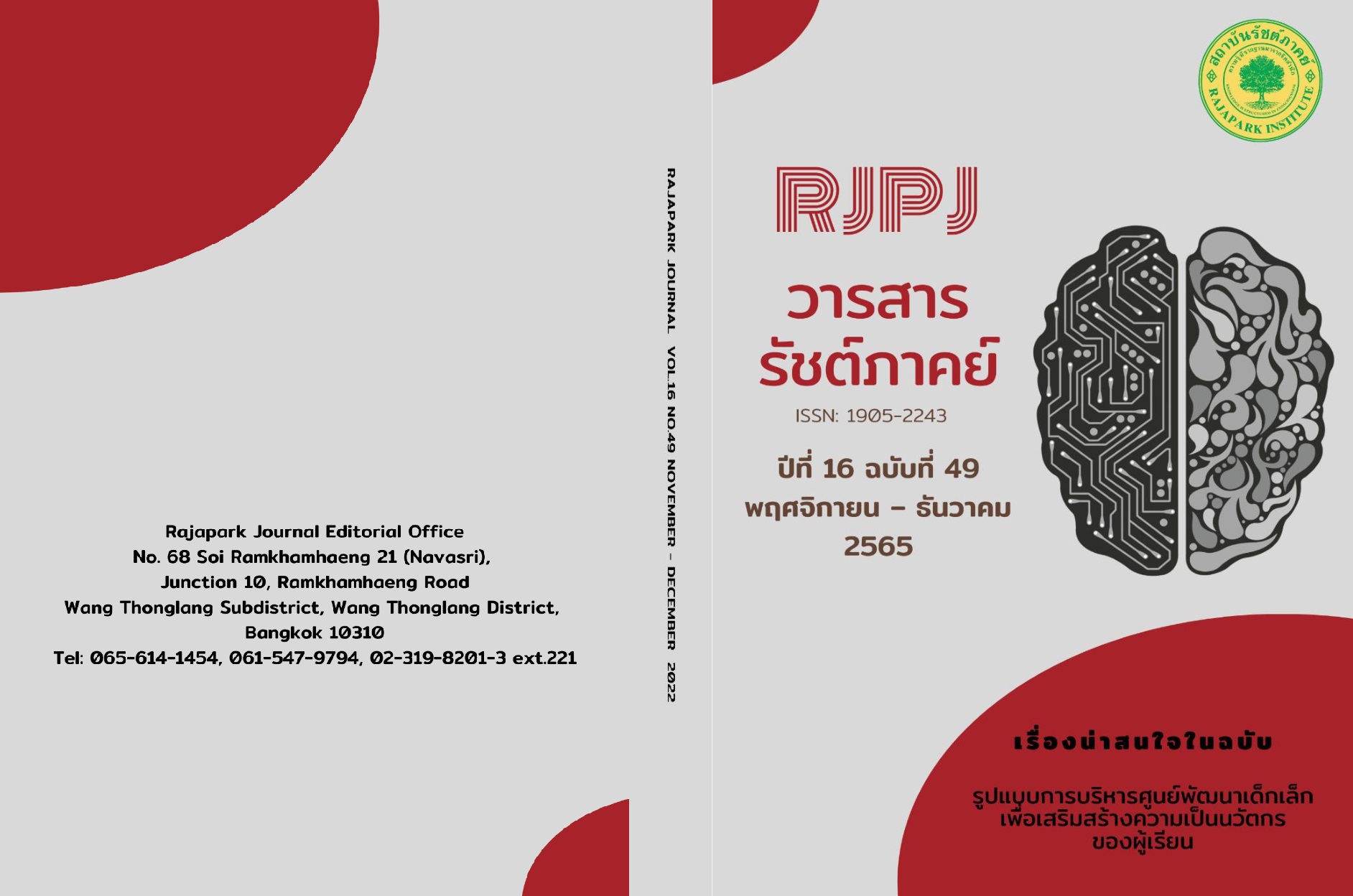The Effect of Online Teaching Management in Learning With Cooperative Learning to Create Innovative Solutions Online Bullying of Undergraduate Students
Main Article Content
Abstract
This research aimed to study 1) the results of online learning; 2) the results of creating innovations to solve the problem of online bullying; and 3) the opinions of students towards the management of online teaching. The research sample consisted of 30 students in the Bachelor of Education program at Nakhon Pathom Rajabhat University, Year 1, selected by purposive sampling in one classroom. The research tools consisted of: 1) an online learning management plan; 2) a test to measure the learning; and 3) an opinion questionnaire of undergraduate students towards online teaching. The content analysis was analyzed using the means, standard deviation, and t-test. The results of the research were as follows: 1) Learning outcomes after studying, it was significantly higher than before at the .05 level. 2) The results of creating innovations to solve online bullying problems for all groups of undergraduate students were good. and 3) The results of an analysis of the opinions of students towards online teaching found that the opinions were at a high level.
Article Details

This work is licensed under a Creative Commons Attribution-NonCommercial-NoDerivatives 4.0 International License.
Views and opinions appearing in the Journal it is the responsibility of the author of the article, and does not constitute the view and responsibility of the editorial team.
References
Bumrungpong, B., & Lerdtomornsakul, U. (2019) Bullying in University: A case study of students with special needs. Quality of Life and Law Journal, 15(2), 49-63. https://so05.tci- thaijo.org/index.php/QLLJ/article/view/240266/163767
Gorzig, A., & Frumkin, L.A. (2013). Cyberbullying experiences on-the-go: When social media can become distressing. Cyberpsychology: Journal of Psychosocial Research on Cyberspace, 7(1), Article 4. https://doi.org/10.5817/CP2013-1-4
Intama, S. (2012). The effects of e-learning by case-based learning activities on problem solving of instructional media design for undergraduate students[Master’s Thesis, Silpakorn University].
Johnson, D.W., & Johnson, R.T. (1987). Learning Together and Alone: Cooperative, Competitive and Individualistic Learning (2nd ed.). Prentice-Hall.
Paiboon, T., Sompong, N., & Kheerajit, C. (2018). Development of Web-Based Instruction on Webpage Construction with HTML by Cooperative Learning Teams Game Tournament Method for Matthayomsuksa 2 Students. Technical Education Journal King Mongkut’s
University of Technology North Bangkok, 9(3), 84-93.
Poovorawan, Y., & Numprasertchai, C. (2003). ICT for Education (2nd ed.). SE-Education.
Sannok, K., Imwut, S., Khamwichai, K., & Jirasatchanukul, K. (2021). Management of online learning innovations in the new lifestyle base era. For students in higher education.
Documents for the 7th National Academic Conference and Presentation on Quality of Management and Innovation. Ubon Ratchathani, Eastern University of Management and Technology.
The Education Council Secretariat. (2017). National Education Plan 2017-2036. Prikwarn Graphics.
Thongkaew, T. (2020). New Normal Based Design in Education: Impact of COVID-19. Journal of Teacher Professional Development, 1(2), 1-10. https://ph02.tci-thaijo.org/index.php/withayajarnjournal/article/view/241830/164268
Tunhikorn, B. (1997). The world's web of spider webs in the world of education. Journal of Science Teachers, 5(1), 18-23.
Wayo, W., Charoennukul, A., Kankaynat, C., & Konyai, J. (2020). Online learning under the COVID-19 epidemic: Concepts and applications of teaching and learning management. Regional Health Promotion Center 9 Journal, 14(34), 285-298. https://he02.tci-thaijo.org/index.php/RHPC9Journal/article/view/242473/165778
Wongnutararot, P. (2001). Psychology of personnel management. Pimdeekarnpim.


